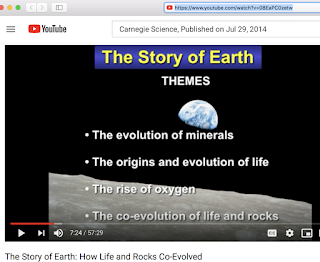In order to get a change of scenery I spent the summer of 2006 working north of Boulder and living in a Teepee. My transportation was mainly my bike and Longmont was a better destination than crowded Boulder. It also sported a very nice library with a big non-fiction audio book collection, which was very exciting considering I’d long run out of decent nonfictions at my home town fiction loving library. Browsing through their rows of “The Great Courses” series, I spied something new "Origins of Life."
Origins of Life
Professor Robert M. Hazen, Ph.D.
George Mason University
With a title like that, I couldn’t say no. It turned out to deliver one astounding surprise after another, along with a few revelations to boot. I needed to listened a second time before returning, despite its 12 hour length. Since then I've made a point of listening to pretty near every YouTube lecture featuring him and there are many.
I also liked that this new understanding also vindicates my own reflexive disgust at having read some serious scientists assume that for the first few billions of years nothing happened on Earth. It seemed a ridiculous notion to me and so it was. Just like junk DNA, or wasted brain matter, nonsense - it was simply that we hadn’t learned enough to know what it was doing yet. Seems that conceit and short sightedness has been a predominate feature in human thinking going way back.
The beauty of science is that truth and honesty and evidence is valued - authoritative facts win in the end. This is because scientists belong to a community of dedicated, competitive, informed, skeptical individuals who buy into the basic premise that: We Need Each Other To Keep Ourselves Honest.
Also they work under a set of rules, that puts honest observation at the top of the list, because constructively learning about our planet, along with her ways and means, is the goal. A place where geophysical facts rule over personal opinion and preferences.
===============================================================
(1) Question authority. No idea is true just because someone says so, including me.
(2) Think for yourself. Question yourself. Don't believe anything just because you want to. Believing something doesn't make it so.
(3) Test ideas by the evidence gained from observation and experiment. If a favorite idea fails a well-designed test, it's wrong. Get over it.
(4) Follow the evidence wherever it leads. If you have no evidence, reserve judgment.
And perhaps the most important rule of all...
(5) Remember: you could be wrong. Even the best scientists have been wrong about some things. Newton, Einstein, and every other great scientist in history -- they all made mistakes. Of course they did. They were human.
Science is a way to keep from fooling ourselves, and each other.
{Mistakes are learning opportunities !}
